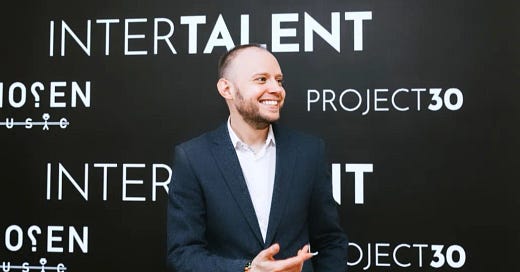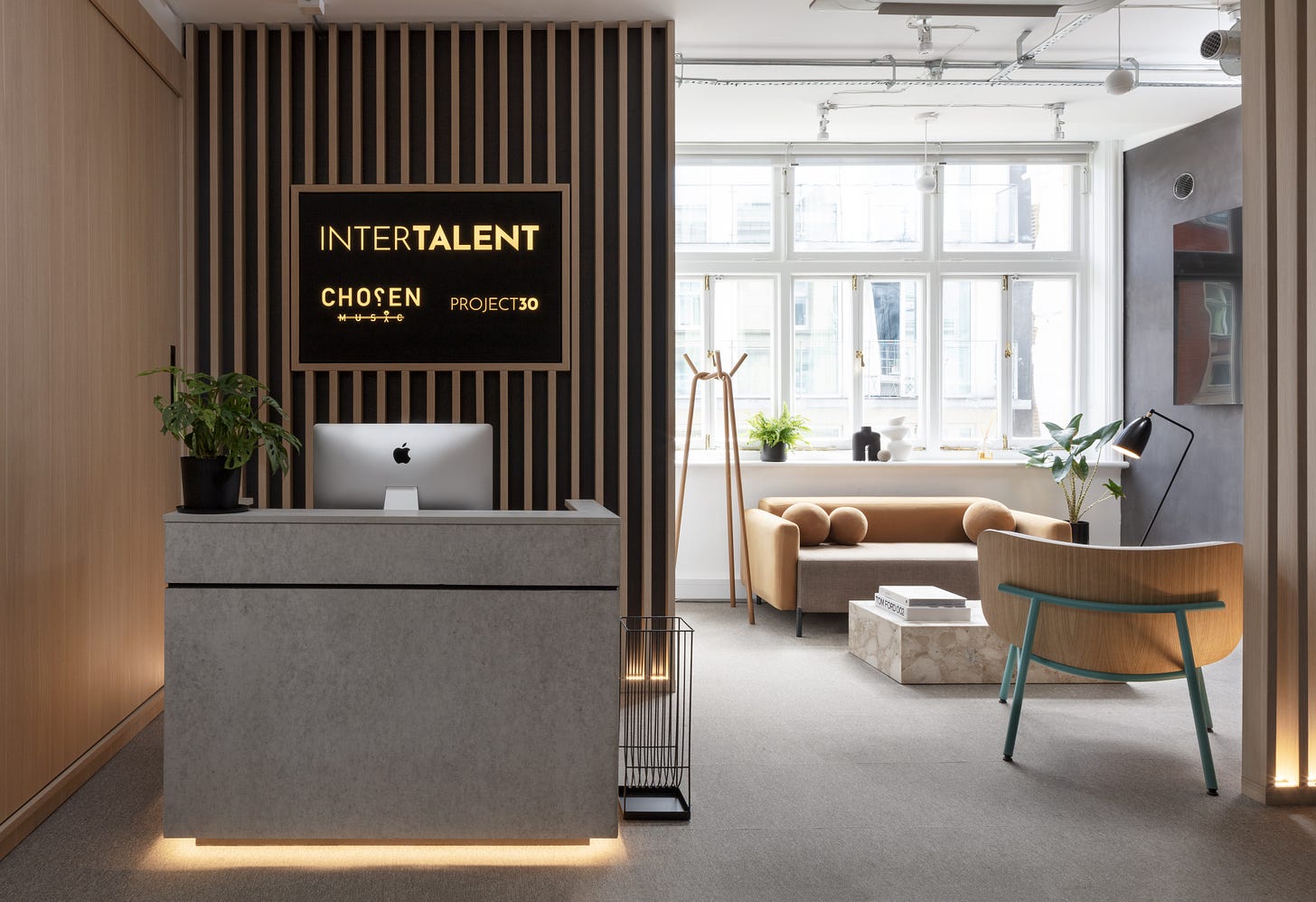Why are brand partnerships dominating conversations between Talent and their Agents?
Alex is the Managing Director of major UK talent agency InterTalent. He represents his clients alongside overseeing the agency's creative strategy, day-to-day operations & acquisitions.
Hi! Please share this post with anyone who is interested in the inner workings of a Talent Agent. If you are not already a subscriber, please sign up and join everyone who receives Dealmakers straight to their inbox. It’s free, which is not a word that an Agent uses often.
If you’ve missed my previous blogs about Talent Agents, just head here to catch up. I’ve written about why you need an agent, what makes a great one, the art of dealmaking and much more.
🤔 Why are brand partnerships dominating conversations between Talent and their Agents?
This week marks my 12-year anniversary at InterTalent, and it's astounding how much has changed here. The company feels more dynamic and innovative than ever, making it hard to believe I’ve been at the company for over a decade. I joined in 2012, at age 26, as the most junior agent in the building. I’d spent the 4 years before that working for the boss of a massive actors agency helping her represent their high-profile mega stars. It was the most incredible training ground, a money-can’t-buy experience. I learned a lot about what to do, what not to do and formed global relationships that still hold strong to this day.
Back then, the entertainment industry primarily revolved around TV, Film, Theatre and Print (Magazines/Newspapers), with fewer opportunities and a smaller pool of talent. Today, the landscape is vastly different, brimming with digital platforms and a huge amount of talent across more genres and niches than ever before. Podcasts and digital-first platforms existed in a niche capacity, and brand partnerships were a very rare situation. The only people who aligned themselves with a brand were Hollywood megastars… but even then it felt a little tacky like they were somehow desperate for money.
How life has changed.
Nowadays, brand partnerships not only exist as the priority of most client conversations and strategies but more often than not they are the primary source of revenue for a talent agency. If you list the clients who consistently collaborate with brands, you’ll be naming the agency’s top earners.
Today, I’m going to lay out why talent agencies are so driven by brand partnerships and why the clients are too.
Let’s go! ⬇️
As I mentioned in my blog about what the entertainment industry looks like in 2024 (check it out here), TV is in a dire situation both in the UK and the States. The slowdown, primarily caused by an ongoing advertising slump, means that there’s less money around and therefore fewer work opportunities. Do I see that changing soon? No. I’m sure there will be an uplift of some description in 2025 or 2026 but the peak days of traditional TV as we know it are not returning. As always, life will shift and the new ways of consuming content will soon become the standard.
In a market slowdown, talent agencies have two choices: persevere and risk failure or pivot to embrace cultural shifts and pursue profitable growth areas. Creativity is a key part of what any talent agency stands for, but without any income it’s pointless. The finances have to add up and if an area of the industry shows high profitability and visibly expanding, you need to grab it with both hands. That’s not just about Brand Partnerships but any growth area of the entertainment industry. Those who stand still will at some point be left behind. I wrote a whole blog on this topic here. Data has become extremely important across the industry. At InterTalent we have become very data-driven to help guide our focus, make strategic decisions and work out which clients (or potential clients) can succeed where. I'll be writing a blog soon about how being a data-driven talent agency is the way forward, and how it boosts creativity instead of killing it.
10-15 years ago, brands put all of their talent budget into one ‘hero’ talent, who would be a superstar name nationally or globally. A key ambassador who would form the basis of TV, Print & Billboard advertising. Maybe even a Radio ad. Social media didn’t exist. Nowadays Brands prefer to spread bet by agreeing partnerships with a multitude of authentic and engaged stars (both broadcast and digital-first talent) to creatively endorse the brand across every available platform. More often than not, those with a smaller following will win the gig over household names, as their audiences are more engaged and tapped into the commercial space. It’s a simple tactic.
More Collaborators ➔ More Content
More Content ➔ Increased Brand Awareness
Increased Brand Awareness ➔ Higher Sales
That’s the goal. It doesn’t always work, of course. Given the deluge of talent advertising brands, the trust in celebrity endorsements has declined since Covid so brands now focus less on fame and more on the data behind the fame. For agents, one of the toughest challenges is convincing ad agencies to choose their talent for brand partnerships. One of the key skills of an Agent is to be a great salesperson and talk a good game about your client. Sell the benefits of them to the person on the other end of the phone. Not here. If the cold hard facts aren’t adding up, then it’s a needle in a haystack.
👀 Brands are looking to see:
an engaged follower base who interact consistently
content which is well-planned, creative and interesting
great execution - it has to look good whether it’s shot on a phone or in an studio
an authentic and truthful relationship with the brand
personality, the talent can’t just look good they need to be a lot of fun too
hitting the same gender / age / location demographics that the brand has
if the talent shares the same core values as the brand in terms
examples of previous brand partnerships, the quality of the content and the conversion into sales
Achieving brand jobs is not easy. Every talent feels they are relevant enough to have brand partnerships. The fees can be eye-watering for often not a lot of work. Some people can make more from one TikTok than shooting a TV series for a month. A lot of pressure is put on Agents to deliver brands for their clients and you can easily lose a client over not achieving it. This is where it’s important to ensure everyone is aligned on the strategy and have an honest conversation about managing expectations.
While it’s clear why talent seeks lucrative brand partnerships, it’s equally crucial for agents.
➡️ Here’s why:
✅ Significant Earnings: Endorsement deals, sponsorships, and collaborations can surpass earnings from other projects, benefiting both talent and their agency. Making money is important to everyone.
✅ Better Choices: It stops your client from saying yes to bad opportunities. With the industry in a state of flux, I’m seeing so many talented people making poor job choices. I get it, we all have to pay our bills, but it smells of desperation and suddenly any star power starts to fade. Having the ability to be picky is powerful.
✅ Enhanced Profile: Working with culturally relevant brands boosts clients' public profiles and their marketability, leading to even more opportunities. Work breeds work.
✅ Agency Reputation: Securing impressive brand deals enhances the agency’s reputation, showcasing its ability to secure high-profile opportunities. You never know which potential new clients will come knocking because of it.
✅ Stronger Negotiation Power: It gives an Agent even stronger bargaining power in negotiations. Talent with a proven track record in generating revenue can command higher fees and more appealing deal terms going forward, whatever the project.
✅ Client Satisfaction: It keeps your client happy. That’s always a good thing.
So what’s the next evolution in the brand space? AI, of course. Brands are already getting creative and are using incredible CGI tools to create the most phenomenal visuals. From the Maybelline mascara eyelashes on the London Underground to the Big Ben North Face jacket. Who needs talent to model a coat when Big Ben can do it for you? They grabbed our attention and our imagination. Now we face the possibility that one day brands won’t need talent.
What will an Agent do then? Well, those who adapt quickly and follow trends will always work out a way to thrive and create but those who stay still will ultimately get left behind.
It won’t be long until every talent agency has an AI division.
If you’d like to get in touch with the Brand Partnerships division at InterTalent please email brands@intertalentgroup.com
Need to catch up on previous blogs? Try some of these…
🤔 What makes a great Talent Agent?
🤔 Should the biggest talent need an Agent?
🤔 What does an Agent actually do?
🤔 What are the secrets of dealmaking?
📥 I would love to hear from you. Any ideas, thoughts and feedback via alex@intertalentgroup.com are always most welcome.
Please subscribe if you don’t already and tell your friends.
See you next time.
Alex





